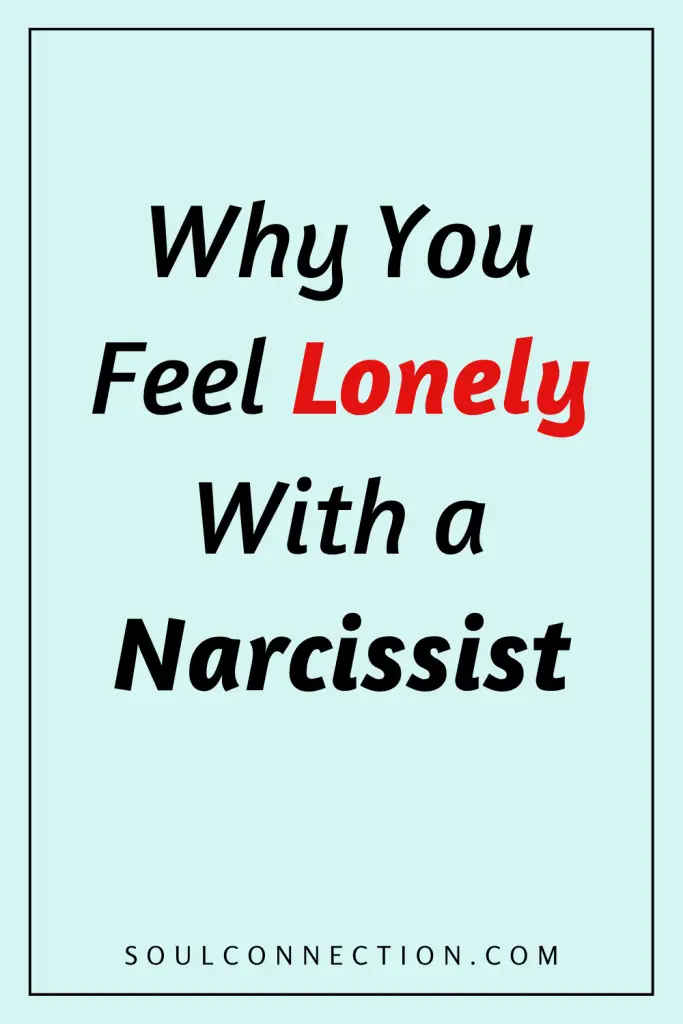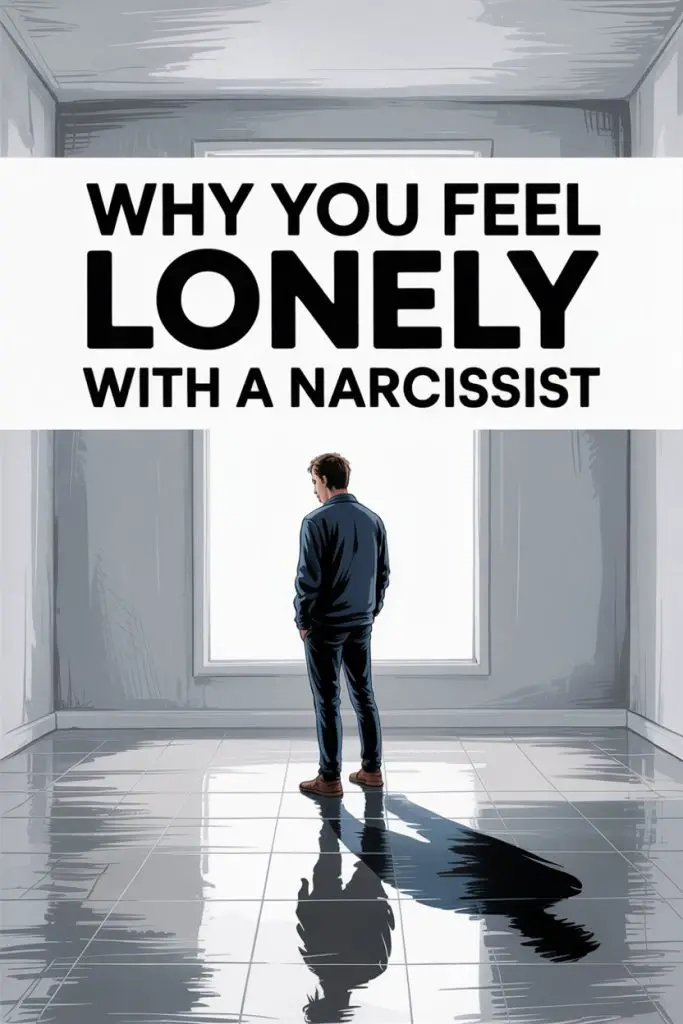Falling for a narcissist can feel like scoring front-row seats at a magic show, only to discover every trick is built on smoke, mirrors, and a disappearing act starring your self-esteem.
If your partner’s declarations of love leave you lonelier than a lost sock at the laundromat, you’re not imagining it. The loneliness is real—and it’s much more common in relationships with narcissists than most people realize.
Let’s peel back the curtain and see why being with a narcissist can be the loneliest gig in town.
Emotional Connection Feels Like a One-Way Street
Relationships thrive on shared emotions, but a narcissist’s empathy tank is running on empty.
You open up about your day, your worries, or that weird dream involving a talking penguin. Instead of feeling heard, you’re met with a blank stare, a yawn, or—worse—a conversation swiftly redirected to their latest accomplishment.
Emotional connection? More like emotional tumbleweeds rolling by.
Over time, this lack of genuine sharing leaves you feeling isolated, craving a closeness that never quite arrives.
Validation Is Conditional, If It Exists At All
Everyone likes a little appreciation, right? With a narcissist, compliments go out faster than last season’s fashion.
You might get praise—when it serves their image. Perhaps you’re their “trophy partner” at a party, but back home, it’s radio silence.
Any validation is strictly rationed, and often doled out to keep you hooked, not to celebrate your happiness.
Start noticing: When was the last time your joy was met with real enthusiasm, versus a quick segue into their own achievements? The loneliness grows as your self-worth gets tangled up in their approval.
Your Needs Are Consistently Overlooked
Hinting at your needs with a narcissist is like sending a message in a bottle… dropped in a puddle.
Maybe you ask for support after a rough day. Instead of comfort, they change the topic or find a way to make your pain about them.
Over time, you learn to stop asking. Your needs start to feel like inconveniences, not priorities.
That sense of being invisible? That’s loneliness, setting up camp right where love should live.
Intimacy Turns Transactional
Sharing affection or having deep talks should feel warm and mutual. With a narcissist, exchanges often come with invisible price tags.
Physical and emotional closeness are given—or withheld—based on how well you play your part. Did you boost their ego today? Good, you might get a cuddly moment.
Did you ask for something they don’t like? Suddenly, they’re “too tired” or mysteriously busy.
Genuine intimacy can’t flourish in a barter system. No wonder it feels like you’re going solo in a two-person dance.
Gaslighting Leaves You Questioning Reality
Speak up about feeling ignored, and suddenly, you’re told you’re “too sensitive” or “making things up.” Gaslighting is a narcissist’s secret weapon, turning your reality upside down.
Maybe you start doubting your memory, your feelings, your sanity. Pretty soon, the loneliness isn’t just about missing connection with your partner—it’s about feeling disconnected from your own self.
When you can’t even trust your perception, reaching out for comfort feels risky. That’s a recipe for deep, persistent isolation.
You’re Walking on Eggshells
Life with a narcissist is peppered with unpredictable reactions. Share good news—maybe they’ll celebrate, maybe they’ll sulk. Voice a concern—prepare for a guilt trip or a cold shoulder.
You might find yourself tiptoeing around topics, rewording requests, or swallowing emotions just to keep the peace. It’s exhausting, and it’s lonely.
You’re so focused on their mood that your own happiness starts to fade into the background.
Your Circle Shrinks (And Not By Accident)
Narcissists tend to dislike competition for your attention. Friends, family, even hobbies can feel threatening to their need for top billing.
You may notice subtle digs about your loved ones or discouragement when you make plans that don’t involve them. Over time, you might cancel outings or skip calls, just to avoid the drama.
Isolation doesn’t happen overnight. But as your world gets smaller, your loneliness grows bigger.
You’re Blamed for the Relationship’s Problems
Every hiccup or argument is somehow your fault. They forgot your birthday? Clearly, you didn’t remind them enough. They snapped at you in public? Apparently, you made them do it.
After a while, you might wonder if you really are the problem. Carrying the blame all by yourself is a heavy, isolating burden—especially when your partner never shares the load.
Your Efforts Go Unnoticed
You plan romantic surprises, put in the work, offer support, and what do you get in return? Often, a shrug, a “Couldn’t you have done more?” or plain indifference.
When your efforts vanish into a black hole, loneliness can feel like your only consistent companion. Relationships are meant to be a two-person project, but here you are, holding both ends of the string.
Emotional Exhaustion Makes It Hard to Reach Out
After so much emotional labor, you may feel too drained to connect with others. Socializing feels like climbing Everest with a backpack full of bricks.
Even if you want to reach out to friends or family, shame or embarrassment might creep in. “Why am I still here?” or “Will they even understand?” keeps you quiet. The silence grows, and the loneliness deepens.
Self-Doubt Becomes a Constant Companion
Repeated criticism, dismissals, and blame chip away at your confidence. You start to question your worth, your judgment, even your ability to love and be loved.
When self-esteem takes a nosedive, so does the ability to connect meaningfully with others. Instead of reaching for support, you may retreat inward, hoping to avoid further hurt.
Why the Loneliness Lingers
Narcissists are often charming, especially when you’re new or useful to them. That intoxicating start can keep you yearning for crumbs of attention, hoping the “good times” will come back.
Unfortunately, those good times rarely return for long. The loneliness persists because you’re not seen for who you are—you’re seen for what you provide.
It’s hard to admit, but even harder to fix the relationship without real change.
What You Can Do Tonight
Spotting the signs is step one. The next move is about reclaiming your sense of self—right now, not someday.
- Connect with someone outside the relationship, even if it’s a quick text or call. One real conversation can remind you what healthy connection feels like.
- Write down your needs—yes, on actual paper. Seeing them in black and white can help you remember they matter.
- Set a small boundary. It might be as simple as saying, “I’m going to bed early tonight,” or “I’d like to watch my show now.” It’s not selfish, it’s survival.
- If you’re able, reach out to a mental health professional. You’d be amazed how much lighter things feel with the right support.
Moving Toward Real Connection
Loneliness with a narcissist isn’t a reflection of your worth or your ability to love. It’s a reflection of a relationship built on one-way streets and shifting goalposts.
Craving closeness is completely natural. The first step to finding it is recognizing where you’re not getting it.
Whether you stay, go, or find a way to transform the relationship, you deserve real connection—filled with warmth, laughter, and a partner who listens when you talk about penguins.
Turns out, you’re not asking for too much. You’re just with someone giving far too little.


